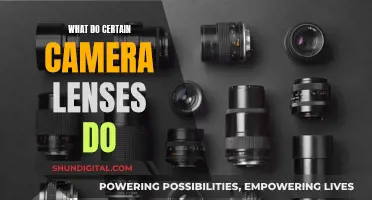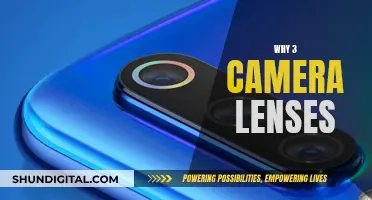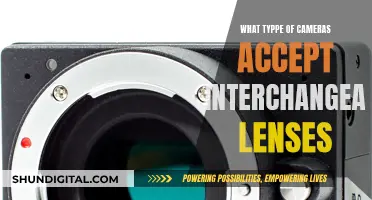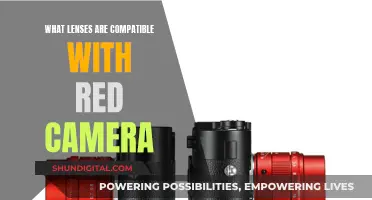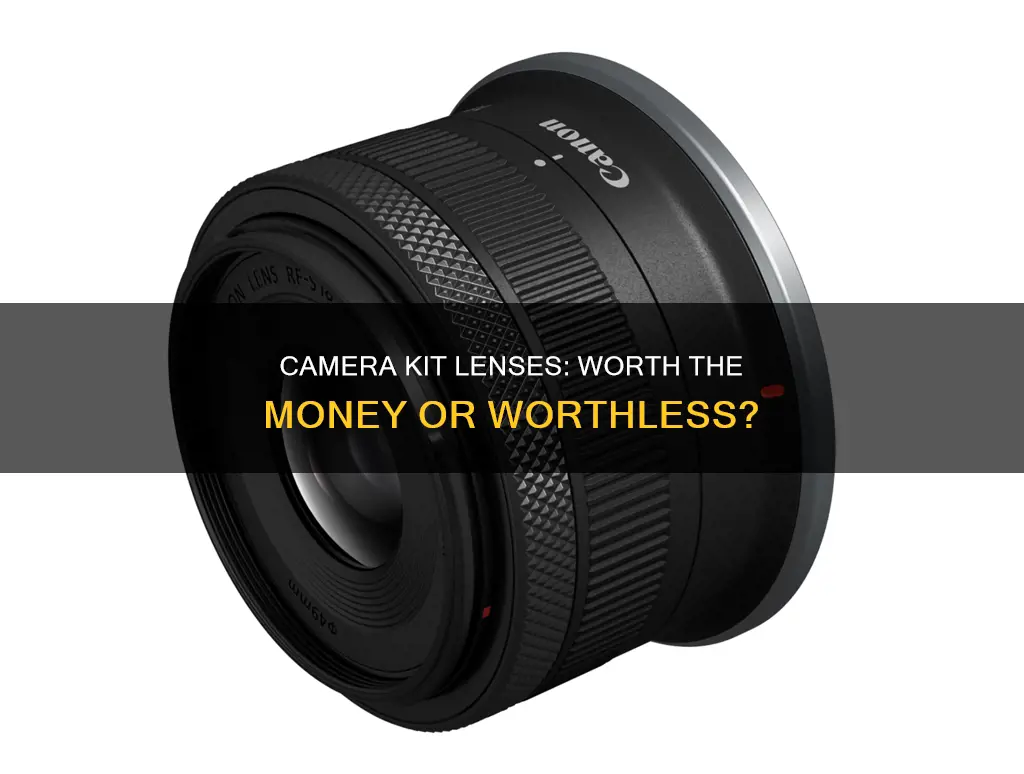
Camera kit lenses are often seen as a rite of passage for beginner photographers. They are usually inexpensive, lightweight, and versatile, making them a convenient option for those new to photography. However, kit lenses have also gained a reputation for being of inferior quality, with poor optics and sharpness. So, are camera kit lenses junk?
| Characteristics | Values |
|---|---|
| Build quality | Usually made of plastic without weather sealing |
| Optical quality | Poor optics can lead to distortion and chromatic aberration |
| Image quality | Affected by the optical quality of the lens |
| Aperture | Variable aperture zoom lens |
| Focal length | Versatile, covering wide-angle to portrait photography |
| Cost | Inexpensive |
| Weight | Small and lightweight |
| Use case | Perfect for beginners to learn and experiment with |
What You'll Learn

Kit lenses are a great starting point for beginners
Kit lenses are also a great way to road test focal lengths before investing in more lenses. They are usually compact and light, making them handy additions to your camera bag. They are also perfect for learning to use your new camera, allowing you to get shooting straight away and get to know your camera menu.
Kit lenses are zoom lenses and are usually a stop-gap to be discarded when the photographer is able to invest in more lenses. They are often made of plastic without weather sealing, and the optics won't always use your camera's technical capabilities to their fullest. They also have variable apertures, which can affect performance in low light.
However, for a beginner, a kit lens is a great way to get started in photography and learn the ropes.
Understanding Camera Lens Interchangeability: What You Need to Know
You may want to see also

They're lightweight and convenient
Kit lenses are lightweight and convenient. They are usually compact and light, making them ideal for travel and everyday use. They are also convenient because they allow you to start shooting with your new camera right away.
Kit lenses are also versatile. They tend to be zoom lenses that cover the most commonly used focal lengths. This makes them adaptable to a range of different shooting situations. For example, the 18-55mm kit lens is perfect for landscapes at its widest angle and for portraits at 55mm.
Kit lenses are also a great way to find your ideal focal length. You can road-test different focal lengths before investing in more lenses.
Kit lenses are also perfect for beginners who want to get to know their camera. They are affordable and allow you to get shooting straight away while you save up for other lenses.
Camera Contact Lenses: Fact or Fiction?
You may want to see also

Kit lenses are versatile
Kit lenses are also versatile in terms of focal length. The 18-55mm kit lens, for example, covers the wide-angle 18mm (perfect for landscapes) up to 55mm (a focal length that can be used for portrait photography), with 35mm in between (ideal for street photography).
The Nikon Z6 is bundled with the 24-70mm kit lens, which is excellent for both wide-angle and short zoom photography. The wide angle works well for landscapes and travel photography, while the longer end produces portraits with nice background compression and minimal distortion.
Kit lenses are also a great way to road test focal lengths before investing in more lenses. You might find that you prefer shooting with a wide-angle lens, or that you enjoy the flexibility of a zoom lens.
While kit lenses might not offer the same optical quality as more expensive lenses, they are a great option for beginners and those on a budget. They allow you to get to know your camera and improve your photography skills without breaking the bank.
Best Places to Sell Your Camera Lenses Online
You may want to see also

They're affordable
Kit lenses are a great option for beginner photographers. They are usually small, lightweight, and convenient, making them ideal for travel and everyday use. They are also versatile, covering the most commonly used focal lengths, so you can easily switch between wide-angle, portrait, and street photography.
One of the biggest advantages of kit lenses is their affordability. They are wallet-friendly for people with a small budget and perfect for those who are new to photography and may not yet know how to care for their equipment. Kit lenses are made entirely of plastic, which keeps the cost down but also makes them lighter and easier to carry.
While kit lenses may not offer the same image quality as more expensive lenses, they are still capable of taking great photos, especially in good lighting conditions. And as you learn and improve your skills, a kit lens can help you become a better photographer by forcing you to understand your camera's settings and modes.
So, if you're just starting out in photography, don't be afraid to give kit lenses a try. They are a cost-effective way to get started and will allow you to learn and experiment with different focal lengths and shooting situations.
Anti-Camera Lenses: Worth the Investment?
You may want to see also

Kit lenses are perfect for learning
Kit lenses are usually small, lightweight, and convenient, making them ideal for travel and everyday use. They are also affordable, so you can start shooting and learning without investing a lot of money upfront.
While kit lenses may not offer the best image quality, it is not a deal-breaker, especially for beginners. You can still take amazing photos with a kit lens if you know how to use your gear correctly.
So, if you're just starting out in photography, don't be afraid to give kit lenses a try. They are a perfect tool for learning and improving your skills.
Lens Thread Compatibility: A Universal Camera Feature?
You may want to see also
Frequently asked questions
A kit lens is a lens that comes as part of a 'kit', bundled with a camera. Kit lenses are usually inexpensive and are often seen as a stop-gap to be discarded when the photographer can invest in more lenses. The most common kit lens is the 18-55mm zoom lens with a varying maximum aperture of f/3.5 – 5.6.
Kit lenses are usually small, lightweight, convenient, versatile, and affordable. They're perfect for beginners to get to know their camera and find their ideal focal length.
Kit lenses tend to be made of plastic without weather sealing, so they're not as durable as other lenses. They also have lesser optical quality and variable apertures, which can affect performance in low light.
If you're a beginner, a kit lens is a great way to get started with photography. You can learn the ropes, find your ideal focal length, and upgrade when you're ready. If you already know what type of lens you want, you may be better off buying the camera body and lens separately.



